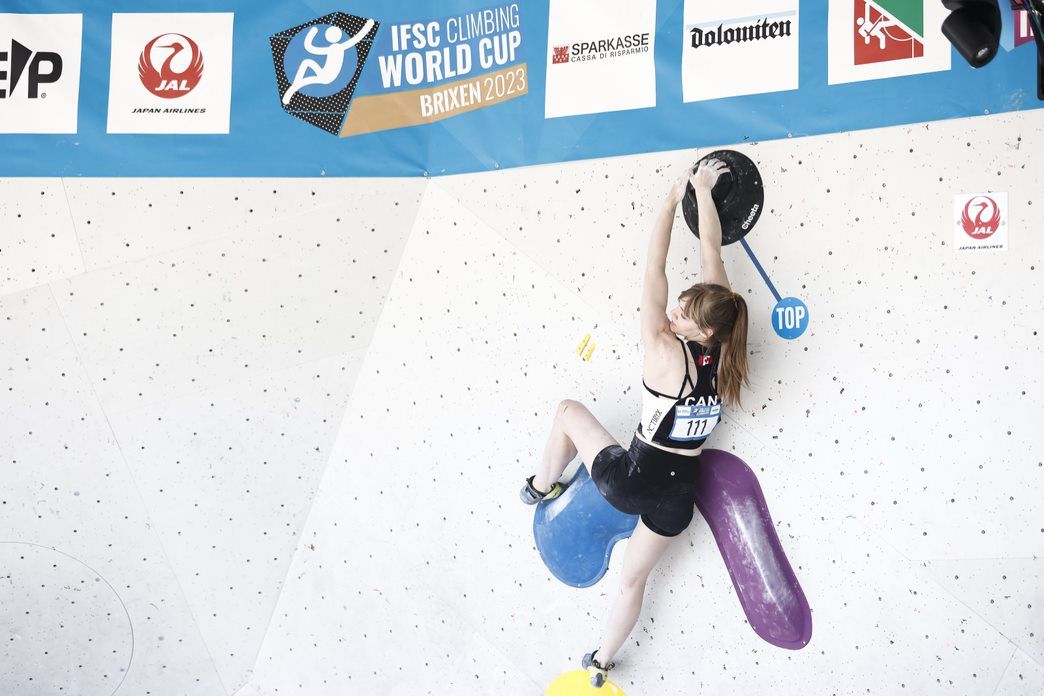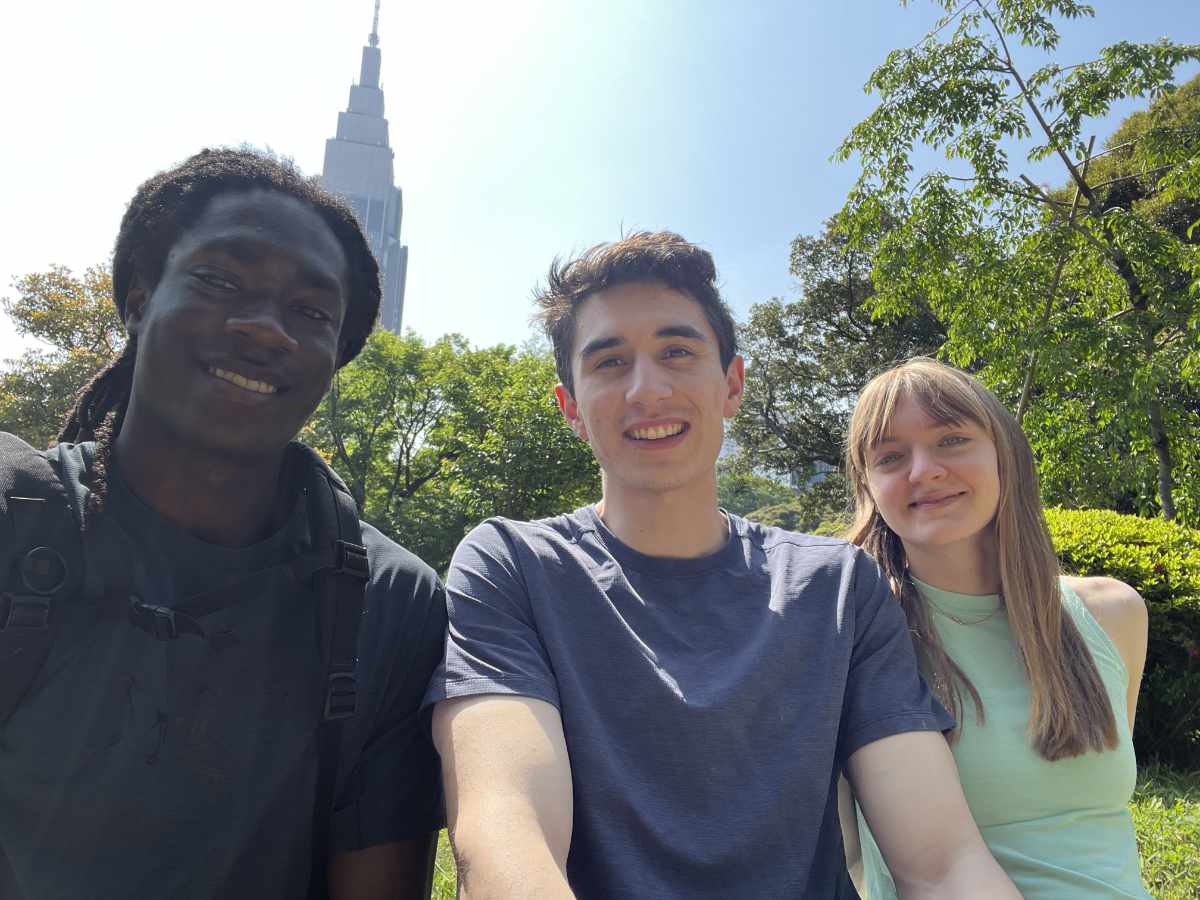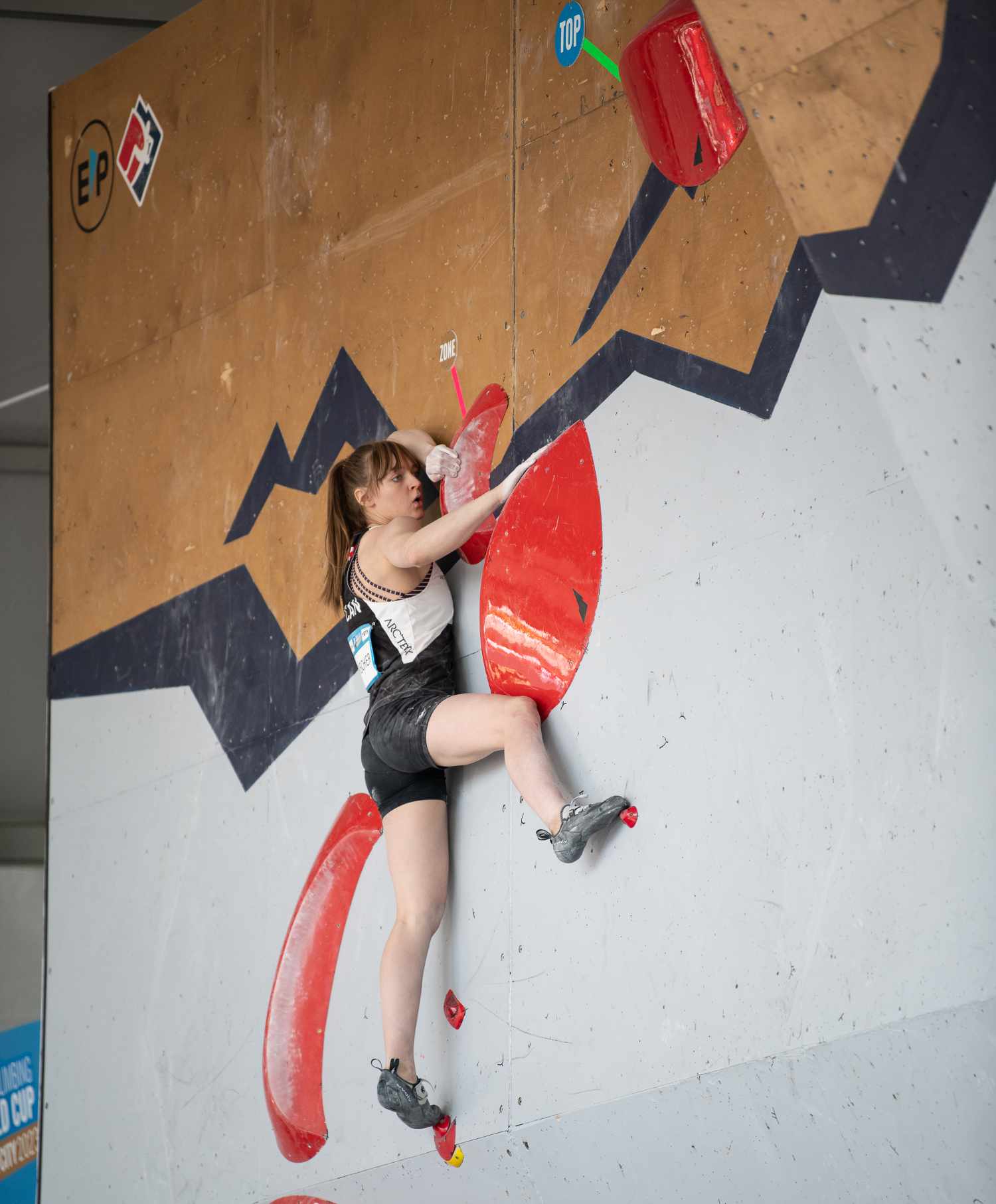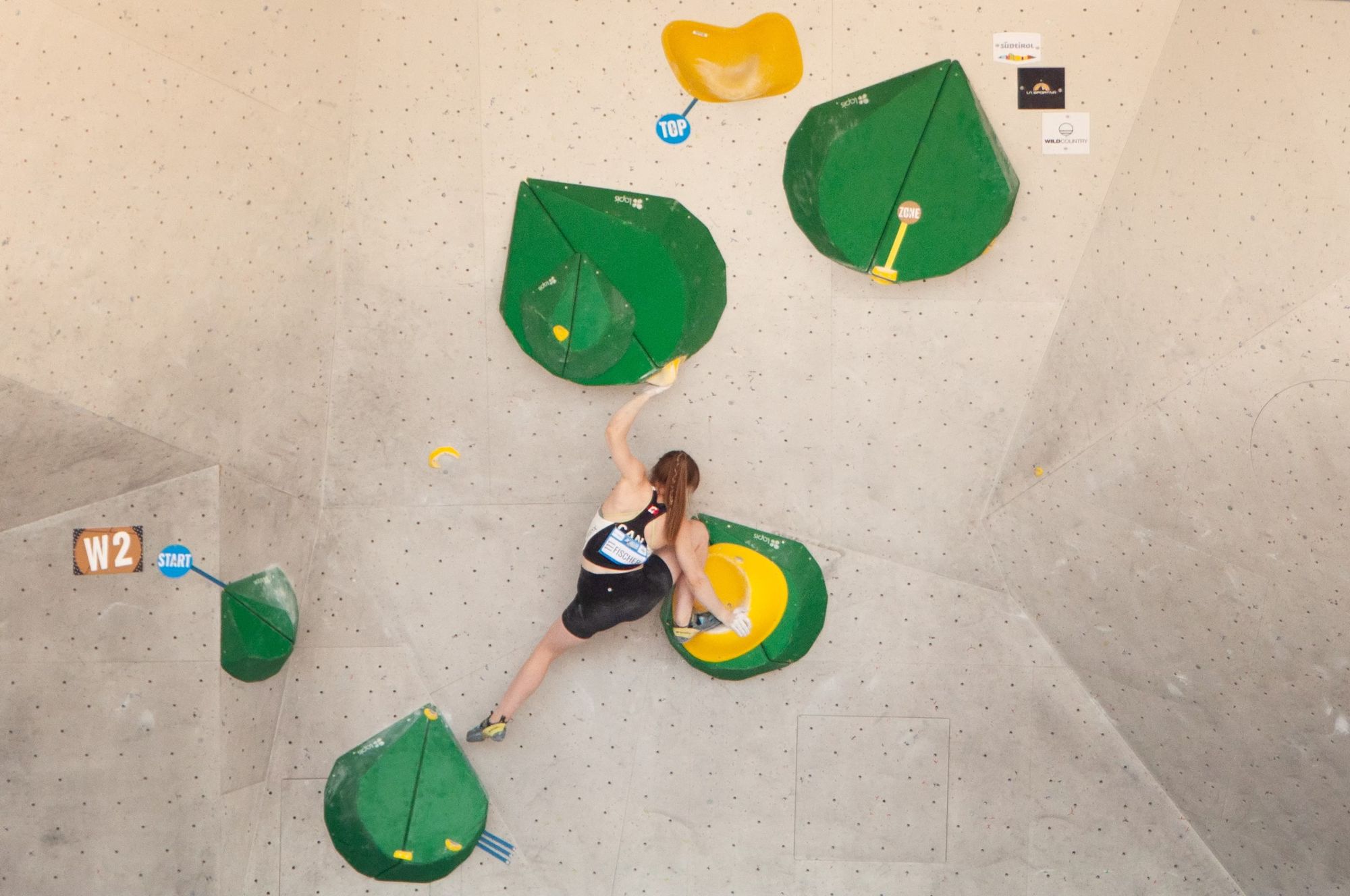My Top 5 Takeaways After a Full Season on the IFSC Circuit
In my first full season on the IFSC Boulder World Cup circuit, I learned more about myself, my performance, and my preparation than any other season.

I've always wanted to compete at every stop in an IFSC World Cup season. I wanted to feel the momentum and the fast-paced lifestyle of a professional sport climber. After six years of competing once or twice a season, it was finally time to do it.
I never had the opportunity to do every World Cup. In my first season, I barely qualified for the one event I attended. In 2018 and 2019, I was still in high school and in both seasons, I could only make it out to two at most. After I graduated, COVID cancelled the 2020 season and heavily restricted the 2021 season, so I only competed at the World Championships in late 2021. In 2022, I planned to do the entire circuit at last, but I sprained my ankle after the first event and only managed to return for the last two events.
Finally, in 2023, I had my chance. I was fully qualified for the season, healthy as a horse, and more prepared than ever. Only a few climbers in Canada can say they've done an entire circuit, and I'm proud to say I'm now one of them!
It was an exciting time, and I learned more about myself, my performance, and my preparation than any other season. I doubled my World Cup experience and learned what it was like to do that many events in a row, a skill you can only acquire by doing the full circuit.
So here are my five biggest takeaways, starting with the most important one:
1. Respect the Off-Season
The most significant mistake I made this season was trying to adjust my performance mid-season. Namely, I tried to get better at beta by watching past World Cups the night before qualifiers to cram in some last-minute beta - something I hardly did in the off-season. It was too little, too late.
I was also managing my weight all season. While maintaining weight after a cut is a thing, I actually tried to lose an extra pound in the three-week break between Seoul and Salt Lake City, which I couldn't do effectively while I was travelling and in performance mode.
Both of these things - the beta and the weight - taught me that I had to work with what I built in the off-season - and I had a lot to work with.
Even though I couldn't lose weight before Salt Lake, it ended up being my best event of the season. I learned that micro-adjustments of my weight mid-season are way more work than reward, and fluctuations don't seriously impact anything but my head, which just needs a stern talking-to.
Beta was a problem all season too, but there was no fixing it once the season began. All I could do was learn from the events I attended and make a note to work on it going forward. It was tempting to try fixing it when I had more events to come, but it's hard to do anything like that when you're mid-season.
You're constantly on the move, have more rest days than training days, and you're confined to 30- or 40-minute sessions when you train. Making progress on weaknesses is an uphill battle, and you're better off exercising one of two options:
- Let go and keep doing your best with the form you have
- Take a few World Cups off to train
Of course, I was already locked into the season (and wanted to complete it), but I realized why Option Two exists. If there is something that you can improve during the season, such as endurance or a particular move, taking an event or two off is a great idea if you'll need it later in the season.
But you'll always find room for improvement. I'll never go into a season completely flawless, but there's still a lot that a flawed athlete can do. Even when you discover deficiencies, it's important to trust all your training in the off-season and recognize that while there is still more ground to cover, you've nonetheless covered a lot.
2. Admit You Want a Friend

This year, Canadian athletes were not funded and thus had their own choice of accommodations. We could stay with other team members or go solo. I chose the latter.
For the Asian leg of the circuit, Zach accompanied me. We travelled, shopped, trained, and checked into hotels and Airbnbs together; it was great. He would be the last face I saw before heading into isolation and the first when I finished my round. He listened to my pre-event worries and reassured me about my training and preparation. He was there for the most post-round debriefs and always had notes on my performance.
But before Salt Lake City, he was tapped out. He was trying to train for his upcoming events through all the travel and schedule his rest days around our flights, my rounds, and the jet lag. It wreaked havoc on his performance to the point where he had to call it and set up camp in Canada until his events concluded.
When it came time to compete in Europe, I flew back to Germany alone and left Zach for a month in North America.
I'd never been to a World Cup alone, and it was pretty lonely. Staying in my own accommodations had its advantages, but it felt isolating without Zach by my side. There was a pretty hefty time change between me and Zach, which only increased when he flew further West for an event in Colorado. It hit me pretty hard in Brixen when I finished what ended up being the best round of my career and walked home to my empty hotel room with no one to share my excitement with on the phone or in person.
I waited nearly six hours to finally share the details of my round with him, and by then, it had dulled.
Sometimes, you have to go alone; I get it. Logistically, the full circuit is hectic. But when you're not close with your teammates and aren't travelling with someone, it can be hard to feel the emotions of a World Cup - the excitement, the pride, the glory, and too easy to feel the hard ones - the disappointment, the envy, the regret.
I didn't think it was so important to me until Brixen. Having someone there in your corner is no small matter. Be it a teammate, a friend, a family member, or a Zach.
3. Be Flexible
I've travelled enough to know that some habits and routines fall apart abroad: You're used to waking up at 8 AM, but jet lag says it's 6 AM now. You like to cook all your meals, but the budget hotel only has a fridge and a coffee machine. You're accustomed to an air-conditioned apartment, but Europe doesn't roll that way.
This World Cup season taught me that veering from the routine is okay. The off-season was the time to double down on a rigid diet and regimented sleep. You've already experienced the benefits of your discipline, so it's okay to let go a little in the off-season. Stressing about an environment that doesn't allow you to maintain your routine will only hurt your performance.
In reality, all you need to compete are your shoes and some chalk.
Of course, it's nice to keep some consistency on the road. That's why I like to choose pre-competition traditions that are easy to replicate no matter which continent I find myself on. For example, I enjoy watching Whiplash or 300 before my events and always have pancakes or waffles on the morning of an event. These, though, are easy to do anywhere in the world. Other peripheral routines, like food and sleep, may need adjustment depending on the country.
Scratch that. They will need adjustment, and you have to prepare for that.
Now that I've been to every stop of the World Cup Circuit, I have a much better idea of where I need to be flexible. For example, I had to turn my diet upside down for two weeks in Asia. Most of my go-to brands weren't available, and I couldn't find plain, non-fat Greek yogurt to save my life. It was a nightmare.
It was the season's first leg, and I was hell-bent on following my routine as closely as possible. At first, it pained me to pivot on my core diet, but after going to the gym and performing as well as I always do, I was reminded of a fundamental truth - it's not that big a deal.
As I said, the work was done in the off-season.
4. Plan for Burnout

I learned this one just before the season began.
Zach and I travel a lot for competitions, training, and leisure. We exercise every mode of public transport out there to travel between cities, countries, and overseas. In March alone (the month before the start of the IFSC season), we were in Munich, Amsterdam, Utrecht, Frankfurt, and Toronto and competed in two international competitions. One was in the Netherlands; the other was in Germany. We also moved into a new apartment at the beginning of the month and to a new continent, no less. Needless to say, it was a busy time for us.
The first World Cup was scheduled for April 21 in Japan, and I could tell I was approaching travel overload. The World Cup season starts with two events in Asia, then you travel to North America and back to Europe, all in just thirty days.
After a taste of the busy travel schedule I had to come, I knew I wouldn't last all season. So, I decided to cut myself off. No leaving the country, no day trips to other gyms or cities - no unnecessary travel. March was a lot. It was manageable but a lot. I wanted it to stay manageable all season, and I certainly didn't want travel fatigue to affect my performance.
Travel is a lot of fun, and I consider myself a travel blogger at times. But there comes a point where it's not so fun anymore. You crave a closet instead of a suitcase. You want to ride your bike to the train station, not a bus or taxi. You get tired of the language barriers and unfamiliar streets. A little is okay, but a lot is tiring.
Of course, the travel will always continue for a professional athlete. These past couple of years have taught me that. You travel to training camps, to other gyms, to nationals, to selection events, to world cups, to paid events, to visit family. It's a wonderful life, but you have to pace yourself.
You have to.
5. Prepare for the Costs
Starting in Germany, I flew to Japan, then Korea, then Vancouver, then Salt Lake City, then Frankfurt, then took a train to Prague, then Munich, then Brixen, then Innsbruck, then home to Frankfurt. That came out to 43 days in lodging and 57 days to eat and live on the road. My climbing federation covered nothing, and my sponsorship aid was minimal. I have to tip my hat to my parents for this one.
I spent a little less than a week at home before the Prague World Cup, and stayed with a friend over the event, and spent a week in Victoria at a speed athlete's apartment while they were at a World Cup. Otherwise, everything from April 15 to June 16 was on the road.
I knew it would be an expensive season, but you only feel it once you're there - checking into hotels, jumping on flights, and buying yourself dinner.
The biggest problem is the in-between time; you must stay somewhere while training between events, and accommodation is the silent killer.
There are two and a half weeks between Seoul and Salt Lake City. There are two weeks between Salt Lake City and Prague. That's over a month that you have to plan out.
You have it easiest if you live on the North American West Coast. You go home after Seoul, take a short flight or car ride to the Salt Lake City World Cup, then go home again until it's time to fly to Prague. You negate a month's worth of accommodations in exchange for a couple of short plane or car rides.
If you're like me and live in Europe, the first half of the season requires careful planning. After Seoul, my best option was to fly to Victoria, Canada for two weeks. Half of my accommodations were free, and I knew the area well. After a quick flight to Salt Lake City, I went home to Frankfurt for a week before taking a train to Prague. Once we got to the train-travel leg of the circuit, the transportation expenses were minimal compared to the intercontinental flights from the first half of the season.
But your planning must also consider travel time, time changes and training availability. You want to avoid taking the cheapest option if it means doubling your travel and nudging yourself toward travel fatigue. It's a balancing act.
When you've been training all year for the season, the last thing you want to do is hinder your performance with poor travel logistics.
And so, the full circuit is expensive.

I have a lot of takeaways from the season, but these are the top 5: train hard in the off-season and go to events as you are, coordinate travel with loved ones or stay with the team, be flexible with your diet, environment, sleep, and routine, limit your travel before the season, and save up!
I've done a lot of boulders in my day. I've done countless pull-ups, dips, and squats. I'm good under pressure, think about the big picture, and know what to expect at a World Cup. These skills make for a talented competitive climber, and I've worked on them for years.
However, something I've never experienced before and had no way of practicing was the full IFSC circuit. Combining all of my skills and balancing sustained performance on top of it all was a new kind of challenge, but now that I've done it once, I'm sure the next time around will be that much easier.
It's funny how experience works.
-Madison Richardson
Originally Published on RichardsonsClimbing.com
